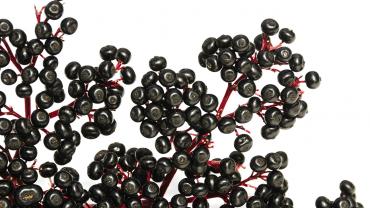
Black elderberry (Sambucus nigra L.) is well known in the scientific community as a supportive natural agent that has exhibited antiviral properties in the scientific research that may be effective against the common cold and flu. Elderberries and their extracts have been used for centuries for a variety of ailments, as they were regarded as “one of nature’s greatest healing plants.” Today, elderberries are one of the most widely used medicinal plants worldwide, particularly for their ability to help stimulate the immune system and potentially reduce the duration and severity of the common cold and flu. These berries are rich sources of bioactive phenolic compounds, such as quercetin and anthocyanins, which have been shown to support antioxidant status in the body.*
In a recently published systematic review of five randomized controlled trials, researchers assessed the benefits and potential harms of elderberry supplementation for the prevention and treatment of viral respiratory infections, and its potential to overproduce pro-inflammatory cytokines that increase the risk of a cytokine storm.
Although elderberry may not reduce the risk from common cold infections, it was shown to potentially reduce the duration and severity of colds, and it may reduce the duration of the flu. There was no evidence on clinical outcomes related to inflammation. However, the evidence demonstrated some beneficial effects on inflammatory markers, including significant reductions in serum C-reactive protein and interleukin-beta after 30 days of supplementation. Compared to a common NSAID, elderberry supplementation was as effective in cytokine reduction over time in a small study. Likewise, compared to prescription antiviral medicine, elderberry was associated with a lower risk of adverse events and complications.
The outcomes showed no evidence that it overstimulates the immune response and suggests that it may be a more natural option to support viral respiratory infection treatment. Larger and longer studies are needed to fully elucidate and determine the significance of the impact of elderberry on inflammation and cytokine storms, as the current evidence is limited.
An in vitro study published in BMC Complementary and Alternative Medicine measured and analyzed the antimicrobial and antiviral activity of elderberry extract against human pathogenic gram-positive and gram-negative bacteria that are responsible for common upper respiratory tract infections (URTIs), along with two different strains of the influenza virus. Bacterial infections during a flu infection can lead to pneumonia. The results of this study showed that a standardized elderberry extract possesses antimicrobial activity against gram-positive Streptococcus pyogenes, groups C and G Streptococci, and the gram-negative Branhamella catarrhalis in human cell cultures. It also displayed inhibitory effects on the proliferation of influenza virus strains A and B.
Another meta-analysis of randomized controlled trials published in 2019 showed that elderberry supplementation effectively reduced URTI symptom duration and severity in 180 patients at the onset of URTI symptoms when compared to the placebo group. Furthermore, flu vaccination status was unrelated to the overall effects of elderberry supplementation on symptoms, appearing equally as effective among both vaccinated and unvaccinated participants.
According to the researchers, there is a demand for natural alternative therapies for routine cases of the cold and flu. Elderberry extracts, such as those in liquid or lozenge delivery form, may be potentially safe and effective as an option for the symptoms of occasional viral URTIs.
By Caitlin Higgins, MSCN, CNS